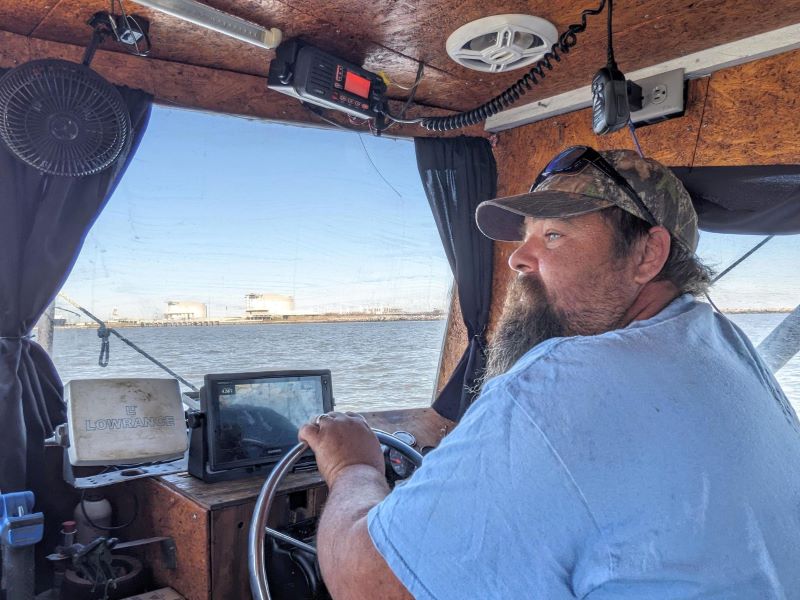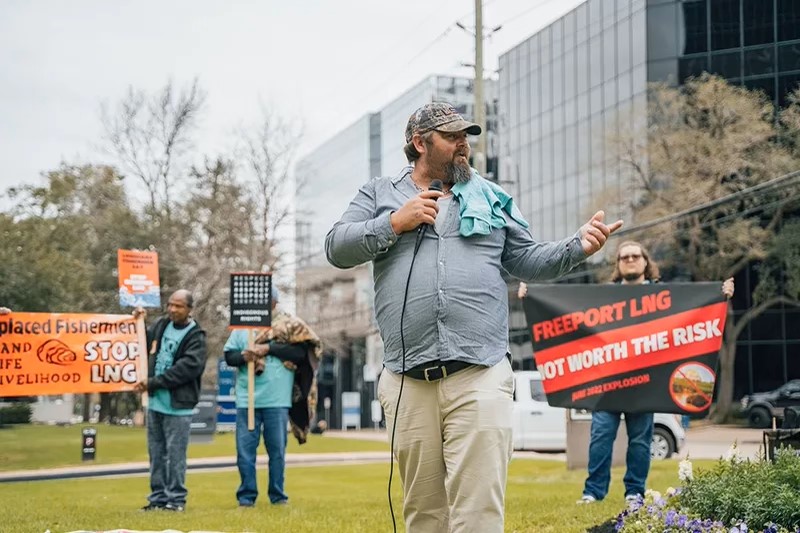Travis Dardar is a Louisiana shrimper and founder of Fishermen Interested in Saving Our Heritage (FISH).
I was six when I started catching shrimp in the waterways of Louisiana. I inherited the livelihood that sustained my father, grandfather, and generations before them. My boat in the Gulf of Mexico is my second home. But I may lose it all – in part to Japan’s dangerous investments in fossil gas.
Eight years ago, fossil fuel companies and their government allies moved Liquefied Natural Gas (LNG) projects into the region and turned our fishing community upside down. The Calcasieu Pass LNG export terminal was just 300 feet from my house, and promised “deep-water access, proximity to plentiful gas supplies and ease of transport for buyers”. Vibrations from its operations were so intense they knocked pictures off my wall. My wife suffered a heart attack, and my children were frequently ill. Facing dire health consequences and daily interruptions, my family was driven from our home.
Most people don’t realize that Japan is bankrolling LNG and the destruction along the US Gulf Coast. Japanese private banks MUFG, Mizuho, and SMBC are the first, second, and third biggest financiers of LNG export projects in the US. These banks have committed more than $13 million, $11 million, and $10 million respectively to US-based LNG projects.
On April 10, Japanese Prime Minister Fumio Kishida will meet with President Joe Biden in Washington, DC to discuss the US and Japan’s commitment to promoting stability in the world and the advancement of clean energy supply chains. Biden clearly understands the need to take a hard look at the impacts of future LNG development as indicated by the pause he announced recently.
His administration has called the climate crisis the “existential threat of our time,” and sees the US as a champion to support other world leaders’ transition to green energy. But my family, and so many around me, are still waiting for change.

Travis Dardar drives his boat on the water with the Calcasieu Pass LNG terminal shown in the background. (Photo: Susanne Wong / Oil Change International)
Massive LNG tankers now crowd the water and wildlife is disappearing. Before the Calcasieu Pass LNG terminal started operating last year, local fishermen caught about 700,000 pounds of shrimp annually. The shrimp catch is now down nearly 90%, with no compensation for losing our livelihoods.
The devastating impacts of LNG on communities like mine and our unwavering opposition is the reason why in January President Biden paused LNG export approvals. The US Department of Energy is supposed to consider how to determine whether these projects are in the public interest and to take into account impacts on communities, ecosystems, and climate. Unfortunately, Energy Secretary Jennifer Granholm recently indicated this pause could be lifted within the year, when what we really need is for President Biden to stop all new LNG export projects for good.
European court rules climate inaction by states breaches human rights
Increasingly, the international community recognizes fossil fuels’ toxic effects on the environment and communities and the momentum is shifting towards clean energy. Yet, Japan is still driving the expansion of gas and LNG in the US, across Asia and globally. In spite of Japan’s declining LNG demand at home, Japan is staking its economic growth on pushing governments across South and Southeast Asia to import LNG.
I invite Prime Minister Kishida to travel on my boat while he is in the US to see for himself the impact of Japan’s dirty energy projects on Gulf communities.
Air pollution hits health
Health deterioration in my community is unsurprising, given the plant’s pollution emissions. Long-term exposure to LNG chemicals can lead to heart disease and certain types of cancer, and living near a pollution center has been linked to increased stress, depression, and other mental health problems.
According to research by the Louisiana Bucket Brigade, the Calcasieu Pass LNG export terminal violated its air pollution permits on 286 of the first 343 days it was in operation – 83% of its first year. Rather than working to clean up its operations, Venture Global, the gas company behind the LNG facility, petitioned the state air quality agency to increase its allowable pollution limits. If the gas project already built can’t even follow pollution regulations, how can we expect the two plants posed for construction upstream to do so?
Despite this, the Gulf area buzzes with Japanese LNG operations. The proposed Calcasieu Pass 2 terminal is part of a 20-year contract with JERA, Japan’s largest gas company and the world’s largest LNG buyer. JERA agreed to buy 1 million tons of LNG annually from the project. INPEX, Japan’s largest oil and gas producer, also signed a 20-year contract to buy 1 million tons of LNG annually. These corporate operations and their profits are behind Japan’s push to expand LNG markets around the world.
Zambia’s fossil-fuel subsidy cuts help climate and kids – but taxi drivers suffer
Japan has developed a regional initiative, the Asia Zero Emissions Community, that will expand and prolong the use of fossil fuels by proposing to abate their emissions. This is a greenwashing effort to push governments in Asia to adopt dangerous distractions like hydrogen, ammonia, and carbon capture and storage. In reality, this will expand and prolong the harm of fossil fuels on communities like mine.
Although Biden’s pause on LNG export authorizations is a step in the right direction, it’s hard to celebrate here in Cameron Parish. LNG tankers dominate the water, and fishers are left to collect the scraps of our communities and livelihoods. Even with the setbacks, our community hasn’t given up hope. I founded Fishermen Interested in Saving Our Heritage (FISH), a united front that will fight to protect our homes, the environment, and access to the Gulf waters. We are focused on saving our way of life.
As the largest LNG exporter in the world, the US holds major influence in this tainted market. During their upcoming meeting, I urge Prime Minister Kishida and President Biden to recognize our future in renewables and stop sacrificing frontline communities for profit.
